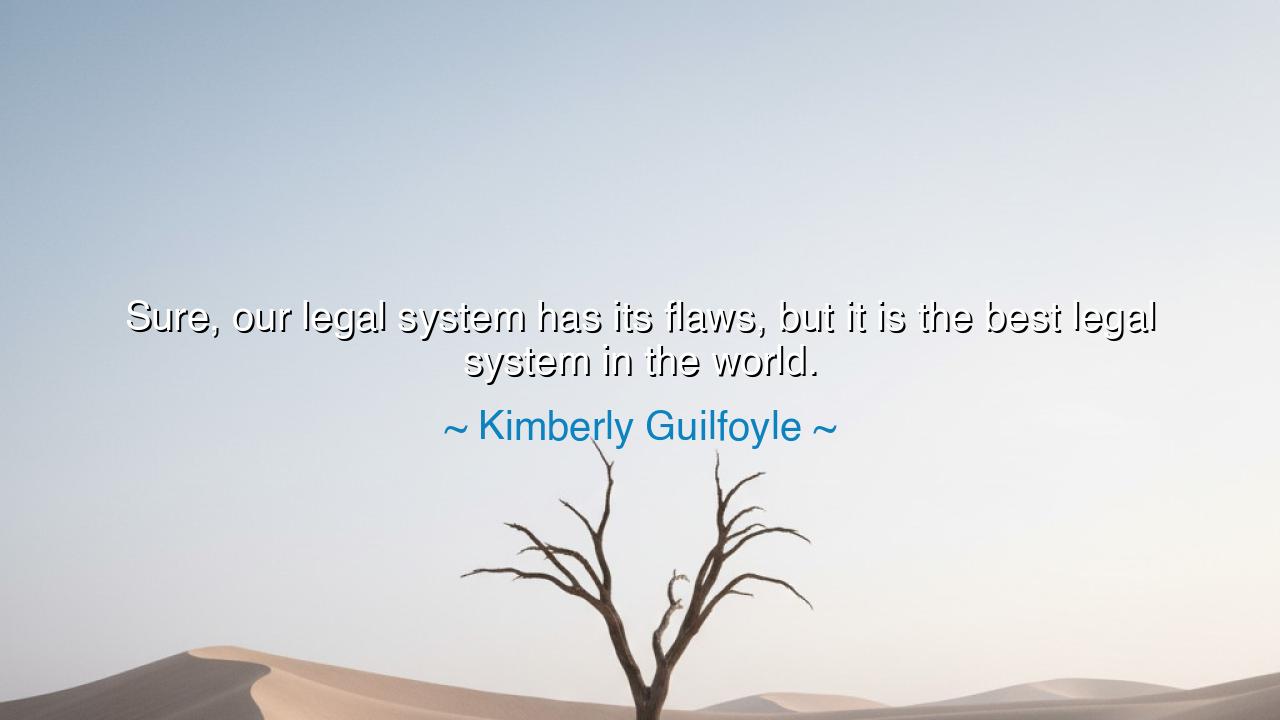
Sure, our legal system has its flaws, but it is the best legal






The words of Kimberly Guilfoyle carry both reverence and realism: “Sure, our legal system has its flaws, but it is the best legal system in the world.” Within this statement lies the tension between idealism and pragmatism, a recognition that perfection is unattainable yet excellence is worth defending. Guilfoyle reminds us that while the law may stumble and courts may err, the foundation upon which justice rests — principles, procedures, and protections — is unparalleled. To honor such a system is to acknowledge its strengths while remaining vigilant against its weaknesses.
The origin of this insight comes from Guilfoyle’s experience as a legal professional and television personality immersed in the workings of the American judicial system. She has witnessed firsthand the ways in which laws protect rights, mediate disputes, and uphold liberty. Her words reflect an understanding that no system is flawless, but that the structures of due process, the independence of the judiciary, and the accountability mechanisms embedded in law set this system apart from many others across the globe. It is a nuanced acknowledgment of both strength and imperfection.
In the annals of history, civilizations have often oscillated between admiration for and criticism of their legal structures. Ancient Athens, famed for its democratic principles, still grappled with inequalities and procedural flaws. Yet its courts and assemblies established a framework for citizens to challenge injustice and participate in governance. Like Guilfoyle, the philosophers of that era would have recognized that no system is without fault, but that certain systems provide unprecedented avenues for justice, protection, and civic engagement.
Consider the historical example of the Magna Carta in 1215, a document that laid the foundation for modern legal protections in England. While the system it created was imperfect and limited in scope, it established principles such as due process and the rule of law, which later generations would expand and refine. Guilfoyle’s statement reflects the same recognition: even a flawed system can be superior to others if it embodies fundamental commitments to justice and safeguards against tyranny.
Her words also highlight the importance of perspective and context. When evaluating a legal system, one must consider the mechanisms of fairness, transparency, and accountability that distinguish it from other societies. Systems that appear orderly but lack impartial courts, codified rights, or avenues for redress may be simpler or more efficient, yet they fail to provide the protections necessary for liberty. Guilfoyle underscores that the value of the system lies not in its perfection, but in its comparative strength, resilience, and fairness.
The statement carries a moral dimension as well. Citizens, lawyers, and judges alike have a responsibility to uphold the integrity of the legal system, to improve its shortcomings, and to defend its principles against erosion. In this light, Guilfoyle’s acknowledgment of flaws is not cynicism but a call to vigilance and stewardship. Ancient thinkers, from Cicero to Confucius, emphasized that the health of a society is measured not by the absence of error, but by the commitment of its people to preserve justice and maintain order.
A modern example can be found in the landmark decisions of the U.S. Supreme Court, such as Brown v. Board of Education, which challenged entrenched racial discrimination in schools. While the legal system had its imperfections, the mechanisms within it allowed for the advancement of civil rights and the protection of fundamental human liberties. Such victories illustrate Guilfoyle’s point: even flawed systems, when properly engaged, can achieve extraordinary justice.
Thus, the wisdom of Kimberly Guilfoyle endures: recognize the imperfections of your legal system, but honor and defend its strengths. Participate actively in its processes, improve its weaknesses, and appreciate the safeguards it provides. For a system that balances liberty, accountability, and fairness, even with flaws, remains a beacon of justice in a world where many societies lack such protections. To understand, respect, and act within this framework is the duty of every citizen, and the path to sustaining a just and resilient society.






AAdministratorAdministrator
Welcome, honored guests. Please leave a comment, we will respond soon